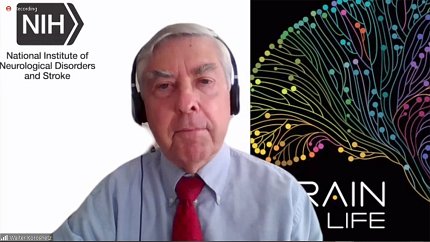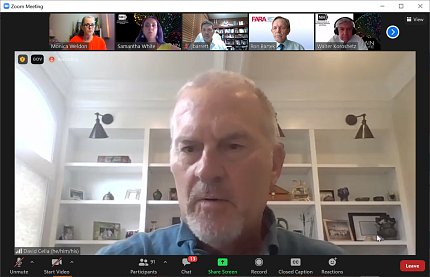NINDS Nonprofit Forum Highlights Early Diagnosis, Patient Advocate Passion

NINDS’s 15th nonprofit forum, “Progress through Partnership,” drew its largest crowd to date with more than 260 participants. Representatives from more than 100 patient advocacy organizations across the country gathered virtually on July 7-8 to network with colleagues, learn about NIH and NINDS and engage with NINDS staff.
“Over the last year, all of us have been working remotely from these little rectangular boxes,” said NINDS director Dr. Walter Koroshetz. “And in terms of advancing our mission, it’s clearly been harder to connect with what it’s all about, which is the patients and how to develop better treatments, figure out ways to better diagnose conditions, and reduce the burden of illness. By connecting with the people at this forum, we become reinvigorated.”
Before the meeting, registrants were treated to a private showing of the movie SPARK: Robin Williams and His Battle with Lewy Body Dementia (LBD). The 45-minute documentary—adapted from the feature film Robin’s Wish that was released last fall—promotes awareness of LBD and was commissioned by the Lewy Body Dementia Association.

The documentary served as preparation for the forum keynote speaker Susan Schneider Williams, wife of the late performer. She talked about the background of both films, the struggle she and her husband faced in finding a diagnosis and her journey to becoming a biomedical research advocate.
“Our story, what we went through, is an example of what you don’t want to have happen,” said Schneider. “Our story is not unique either. There are over a million and a half people dealing with this [LBD] in the United States alone.”
Schneider emphasized the importance of getting a diagnosis and underscored one of the overall themes of the forum—the value of an early diagnosis.
“Diagnosis is everything, not only with this disease but with so many diseases. For someone with a LBD diagnosis, at least you would know you could stop chasing the unknown foe,” she explained. “Diagnosis gives you your power back. When you have a proper diagnosis, you have more of a chance of getting the correct help. And that’s key, particularly for a disease like Lewy body dementia.”
The meeting also featured three timely panel discussions. “Clinical Solutions Following Covid” focused on ways researchers and clinicians were able to adapt in the wake of the pandemic and how they hope increased flexibility and accessibility will inform trial design in the future. Panelists explored health equity during the “Patient Engagement: Co-Producing Clinical Success” discussion as moderators emphasized NINDS efforts to address the needs of diverse stakeholders across the research landscape.

At the “Nonprofit Tools and Resources of Note” session, presenters shared several tools available including the NIH Toolbox (a comprehensive set of neuro-behavioral measurements to assess cognitive, emotional, sensory and motor functions) and PROMIS (Patient-Reported Outcomes Measurement Information System).
The forum provided several opportunities for nonprofit representatives to engage with NINDS staff including pre-scheduled one-on-one discussions and the Meet the Program Directors session.
The meeting concluded with success stories from three advocate scientists and mothers—Dr. Allyson Berent of the Foundation for Angelman Syndrome Therapeutics, Dr. Nathalie Maitre of NICU Developmental Therapies at Nationwide Children’s Hospital and Dr. Dominique Pichard of the International Rett Syndrome Foundation (IRSF).
In each presentation a common thread was woven through all patient advocacy groups and throughout the meeting—passion.
“Passion drives this work. It was a passion of those original families that started our two legacy foundations,” Pichard said. “And it’s the passion of the individuals that continues to work in the IRSF. And that helps to make a difference every single day. A small, yet ambitious group can really make a significant impact.”
Panelists encouraged the group to connect with pharmaceutical companies, reach out to the Food and Drug Administration early to talk about natural history studies and engage with industry especially regarding regulatory information and registries.
Speakers also shared information on clinical trial readiness and the importance of early diagnosis. “The earlier the better,” said Berent. “The earlier the diagnosis, the earlier the intervention and potentially the better the outcome.”
In closing, Koroshetz explained how the passion of patient advocates can drive scientists to develop treatments.
“From the scientist’s point of view,” he said, “science is mostly motivated—at least early on—by curiosity, but that doesn’t necessarily get you to treatments. What gets you to the treatments is the passion. It’s really something that should not be underestimated because it’s the passion of the people we heard talking today who are in the nonprofits, many of whom have kids with disorders, that really drives the treatments. The passion that you have is contagious and what you want to do is infect the right people with your passion. You want to spread the passion that you have to the people who can help you get to your goal and that’s the scientists, and sometimes, it’s people like the FDA and sometimes it’s the people at NIH.”
For more information on NINDS nonprofit forums, visit https://www.ninds.nih.gov/About-NINDS/Who-We-Are/Nonprofit-Forum.
